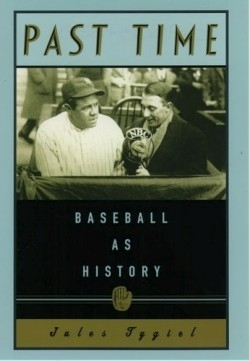Past Time
Baseball as History
Introducing this collection of nine (as in nine innings) essays, Tygiel hurls a beanball at the intellectuals who over the past couple of decades have reveled in an orgy of mysticism and sentimentality about what should be a pretty down-to-earth subject: baseball. Bart Giammati, the Yale president-turned-baseball commissioner, might rhapsodize that the sport is “the last great arena—where everybody can learn the lessons of life.” Filmmaker Ken Burns might intone that it “encodes and stores the genetic material of our civilization.” Tygiel, professor of history at San Francisco State University whose previous works include Baseball’s Greatest Experiment: Jackie Robinson and His Legacy, offers a less majestic but probably more on-target assessment. Baseball is simply a great game that for the past century and a half “has reflected broader changes in society and maintained a special place in American culture.”
Instead of another book about baseball history, Tygiel offers a history book that examines life in the United States from the mid-nineteenth century to the present through the distinctive lens of baseball. As the author demonstrates, profound social and political issues have found their way onto the baseball diamond and into its front offices, including labor-management strife, racism and the astonishing explosion of technology.
Any baseball fan will attest that one of the most enjoyable ways to study its history is to examine the lives and careers of legendary players. Tygiel profiles some of the game’s most important, yet overlooked, figures. Tracing its rise to the status of “national pastime” in post-Civil War America, he introduces Henry Chadwick, the British immigrant who developed many of the statistics—box score, batting average, tabular standings—that make baseball more meaningful for players and fans. Charles Comiskey, Connie Mack, John McGraw and Clark Griffith were early magnates and innovators who influenced how the game was organized and played. Christy Walsh, a shrewd public-relations man, helped make Babe Ruth a larger-than-life cultural phenomenon decades before the appearance of predatory player agents. The entrepreneurial creativity of Branch Rickey and Larry MacPhail helped baseball survive the Depression and World War II, and Rickey led the assault on baseball’s “color line” by signing Jackie Robinson. Subsequent essays chronicle baseball’s role in the spread of radio and television and the modern “fans’ movement,” with fantasy camps and computer-driven Rotisserie leagues.
Many of the events and personalities in this book will be familiar to rabid fans. Yet Tygiel’s original perspectives make it a valuable addition to the substantial body of baseball literature. No less welcome is the author’s optimistic conclusion that professional baseball, despite its many warts, is as resilient as the nation itself, and will survive what sometimes appear the best efforts of greedy players and owners to destroy it.
Reviewed by
John Flesher
Disclosure: This article is not an endorsement, but a review. The publisher of this book provided free copies of the book to have their book reviewed by a professional reviewer. No fee was paid by the publisher for this review. Foreword Reviews only recommends books that we love. Foreword Magazine, Inc. is disclosing this in accordance with the Federal Trade Commission’s 16 CFR, Part 255.

